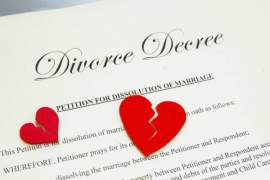
What Is a Divorce Decree

It can actually be confusing in many ways when considering what is a divorce decree. In some states, the same question could be asked like this: “what is a dissolution of marriage”, or “what is a judgment of divorce.”
So What Is a ‘Divorce Decree’?
It’s simply when a judge/official rules on a petition for divorce, either saying that the divorce is official or not. Typically, this ‘decree’ is issued out at the end of the whole petition process for divorce and marks the official end of a marriage.
When asking what is a divorce decree, though, one must understand that anything written in it is completely binding, such as….
1. Property Distribution Provisions
2. Child Custody Ruling
3. Parenting Time Hours and Days
4. Holiday Schedules for Both Parties
5. Alimony
6. Child Support Amount Per Month
7. And the Specific Grounds for Divorce
This means that when asking what is a divorce decree will include the immediate order that everything on the decree must be followed to the letter. For instance:
1. A Custodial Parent Must Adhere to the Parenting Time Order in the Decree
2. Alimony Must Be Paid, No Exceptions
3. Child Support Will Be Enforced If Not Paid for Any Reason
4. Anything Else Written in the Decree, If Violated, Can Be Presented in Court
In other words, the Decree protects the provisions of the divorce. Easily, either party can either accidentally or purposely violate any part of the Decree. The point of the Decree is to ensure that the law is followed to the last letter.
Can There Be Multiple Divorce Decrees?
Of course. Just like there can be multiple marriages (at separate times). And it may be completely possible that the question of what is a divorce decree can vary from provision to provision.
One Decree might list that the grounds for divorce was adultery. And that – depending on the state and county from which the Decree was issued – can affect how parenting time and alimony and possibly other provisions might turn out compared to a Decree that is completely “No-Fault,” meaning that the only reason for a divorce was a complete “breakdown” of the marriage on both parties.
Furthermore, depending on how many kids there may be in any marriage, child support can be a whole lot different in any given Decree. One Decree might have it listed that there’s a wage garnishment for a specific amount to cover the expense and living requirement for four children; whereas another Decree might simply list that stubs must be sent to the non-custodial parent who happens to work a self-employed job (author, lawyer, contractor, etc. etc.) and can’t have any wage garnishments, plus that particular Decree only will apply to one child.
In other words, the amount of child support for any Decree can vary pretty widely. And the same goes for alimony.
Be Prepared Either Way
Again, just know this: a Divorce Decree is simply final. It’s the end result.
So it would be wise for both parties to conform to the Decree to the letter. It becomes law in a divorce, and there’s no changing it in the future.



















